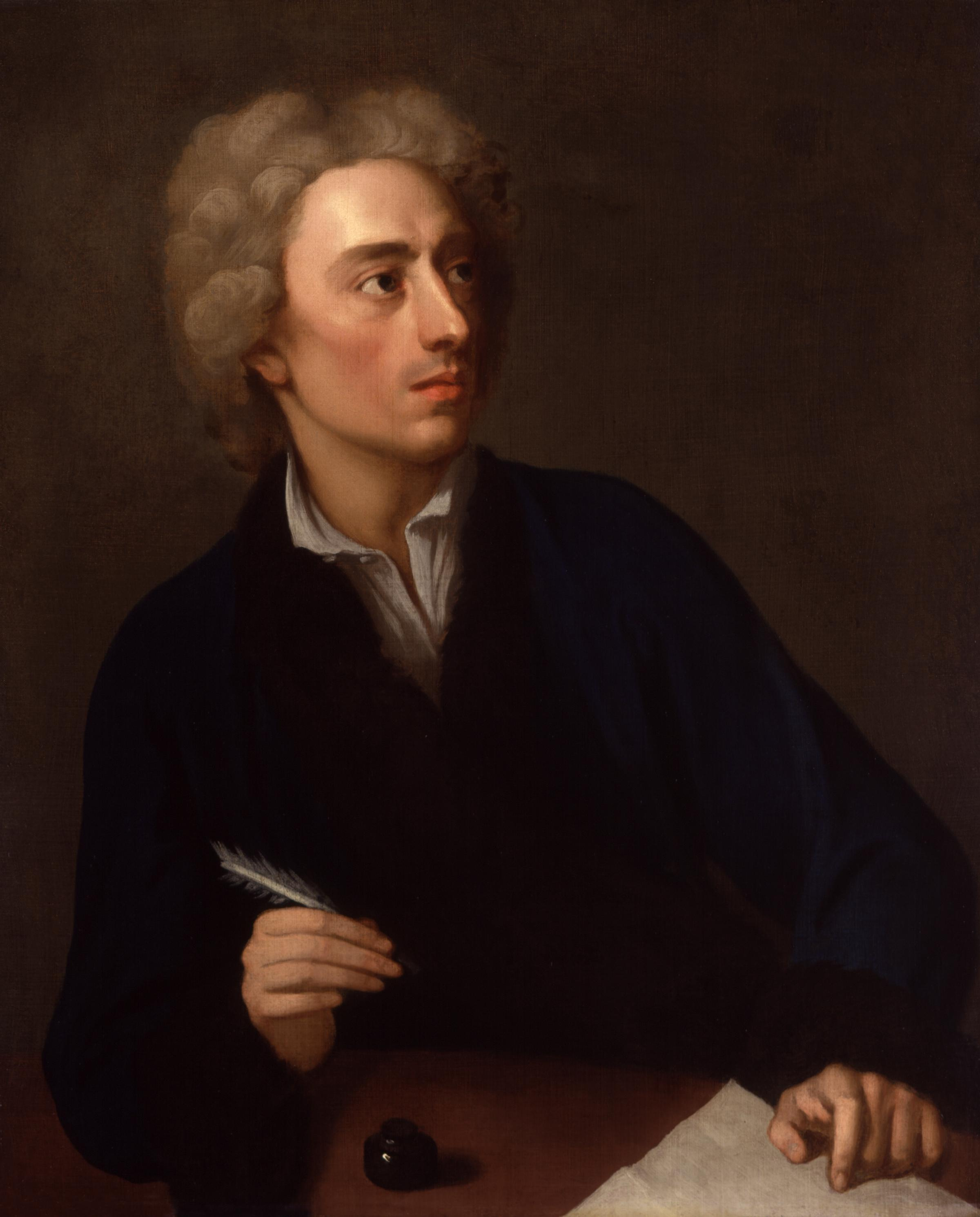Alexander Pope Frases famosas
“A luz e as trevas estão misturadas no caos do homem.”
This light and darkness in our chaos join'd
"Essay on Man" in: "The Works of Alexander Pope", Esq: Esq. with Notes and Illustrations by Himself and Others. To which are Added, a New Life of the Author, an Estimate of His Poetical Character and Writings, and Occasional Remarks - vol. 5, Página 105 http://books.google.com.br/books?id=KCQOAAAAQAAJ&pg=PA105, Printed for J. Rivington,
Citações de homens de Alexander Pope
“Feliz do homem que não espera nada, pois nunca terá desilusões.”
Blessed is he who expects nothing, for he shall never be disappointed.
carta de 6 de outubro de 1727, in: "The works of Alexander Pope. With his last corrections, additions, and improvements. Publ. by mr. Warburton. With occasional notes." - Página 126 http://books.google.com.br/books?id=V0oVAAAAQAAJ&pg=PA126, Alexander Pope - 1751
Alexander Pope frases e citações
“Errar é humano; perdoar é divino.”
To err is human, to forgive divine
"Essay on Criticism" [Ensaio sobre a crítica] ( Escrito no Ano MDCCIX, http://books.google.com.br/books?id=O0IfAAAAMAAJ&pg=PA241&dq=To+err+is+human,+to+forgive+divine+Alexander+Pope&lr=&client=firefox-a#PPA169,M1 primeira publicação na Spectator, N º 65, 15 de maio de 1711); in: "The Works of Alexander Pope, Esq" http://books.google.com.br/books?id=O0IfAAAAMAAJ&pg=PA241&dq=To+err+is+human,+to+forgive+divine+Alexander+Pope&lr=; Por Alexander Pope, Joseph Warton; Publicado por Printed for B. Law, J. Johnson, C. Dilly [and others], 1797, página 236
“Uma pessoa honesta é a obra mais maravilhosa de Deus.”
An honest man's the noblest work of God
"Essay on Man, Epistle IV. Of the Nature and State of Man with repect to Happiness"; in http://books.google.com.br/books?id=ZGRj7T5ZrFMC&pg=PA143&dq=%22An+honest+man%27s+the+noblest+work+of+God%22+Alexander+Pope&lr=&as_brr=3: "The Works of Alexander Pope"; Por Alexander Pope, Joseph Warton; Publicado por Printed by J.F. Dove for Richard Priestley, 1822; página 143
Poema de Alexander Pope, citado no filme "Brilho Eterno de uma Mente sem lembranças"
Happy the man, whose wish and care. A few paternal acres bound, Content to breathe his native air. In his own ground.
Letters of Alexander Pope and several eminent persons from the year 1705 to 1735 - Página 64 http://books.google.com.br/books?id=u075WPEcfDQC&pg=PA64, Alexander Pope - 1735 - 266 páginas
Variante: Aquele que diz uma mentira não calcula a pesada carga que põe em cima de si, pois tem de inventar infinidade delas para sustentar a primeira.
Alexander Pope: Frases em inglês
Statement of 1739, as quoted in Observations, Anecdotes, and Characters, of Books and Men (1820) by Joseph Spence, p. 286.
Variant reported in Familiar Short Sayings of Great Men (1887) by Samuel Arthur Bent, p. 451: "True politeness consists in being easy one's self, and in making every one about one as easy as one can."
Attributed
In his letter to Atterbury Bishop of Rochester. Sept. 23. 1720.
Epilogue to Rowe's Jane Shore (1714).
“This casket India's glowing gems unlocks
And all Arabia breathes from yonder box.”
Canto I, line 134.
The Rape of the Lock (1712, revised 1714 and 1717)
“The hungry judges soon the sentence sign,
And wretches hang that jurymen may dine.”
Canto III, line 21.
The Rape of the Lock (1712, revised 1714 and 1717)
“Luxurious lobster-nights, farewell,
For sober, studious days!”
"A Farewell to London" (1715), st. 1.
Letter, written in collaboration with Dr John Arbuthnot, to Jonathan Swift (December 5, 1732) upon the death of John Gay.
"Sappho to Phaon", line 52 (1712).
“Unblemish'd let me live, or die unknown;
O grant an honest fame, or grant me none!”
Closing line.
The Temple of Fame (1711)
“Now lap-dogs give themselves the rousing shake,
And sleepless lovers, just at twelve, awake.”
Canto I, line 15.
The Rape of the Lock (1712, revised 1714 and 1717)
Fonte: The Temple of Fame (1711), Lines 449-458.
Letter to Edward Blount (27 August 1714); a similar expression in "Thoughts on Various Subjects" in Swift's Miscellanies (1727): Party is the madness of many, for the gain of a few.
“A god without dominion, providence, and final causes, is nothing else but Fate and Nature.”
Isaac Newton: Principia Mathematica (1687); Rules of Reasoning in Philosophy, Rule IV.
Misattributed
“On her white breast a sparkling cross she wore
Which Jews might kiss, and infidels adore.”
Canto II, line 7.
The Rape of the Lock (1712, revised 1714 and 1717)
As quoted in Anecdotes, Observations, and Characters, of Books and Men (1820) by Joseph Spence [published from the original papers; with notes, and a life of the author, by Samuel Weller Singer]; "Spence's Anecdotes", Section IV. pp. 134–136.
Attributed
Fonte: The Works of Mr. Alexander Pope (1717), Elegy to the Memory of an Unfortunate Lady, Line 51.
“Let opening roses knotted oaks adorn,
And liquid amber drop from every thorn.”
Autumn, line 36.
Pastorals (1709)
“On all the line a sudden vengeance waits,
And frequent hearses shall besiege your gates.”
Fonte: The Works of Mr. Alexander Pope (1717), Elegy to the Memory of an Unfortunate Lady, Line 37.
“For he lives twice who can at once employ
The present well, and e'en the past enjoy.”
Imitation of Martial, reported in Mr. Pope's Literary Correspondence (1737), Vol. V, p. 232; The Poems of Alexander Pope, ed. John Butt, sixth edition (Yale University Press, 1970), p. 117. Compare: "Ampliat ætatis spatium sibi vir bonus; hoc est Vivere bis vita posse priore frui" (Translated: "The good man prolongs his life; to be able to enjoy one's past life is to live twice"), Martial, X, 237.; "Thus would I double my life's fading space; For he that runs it well, runs twice his race", Abraham Cowley, Discourse XI, Of Myself, stanza xi.
